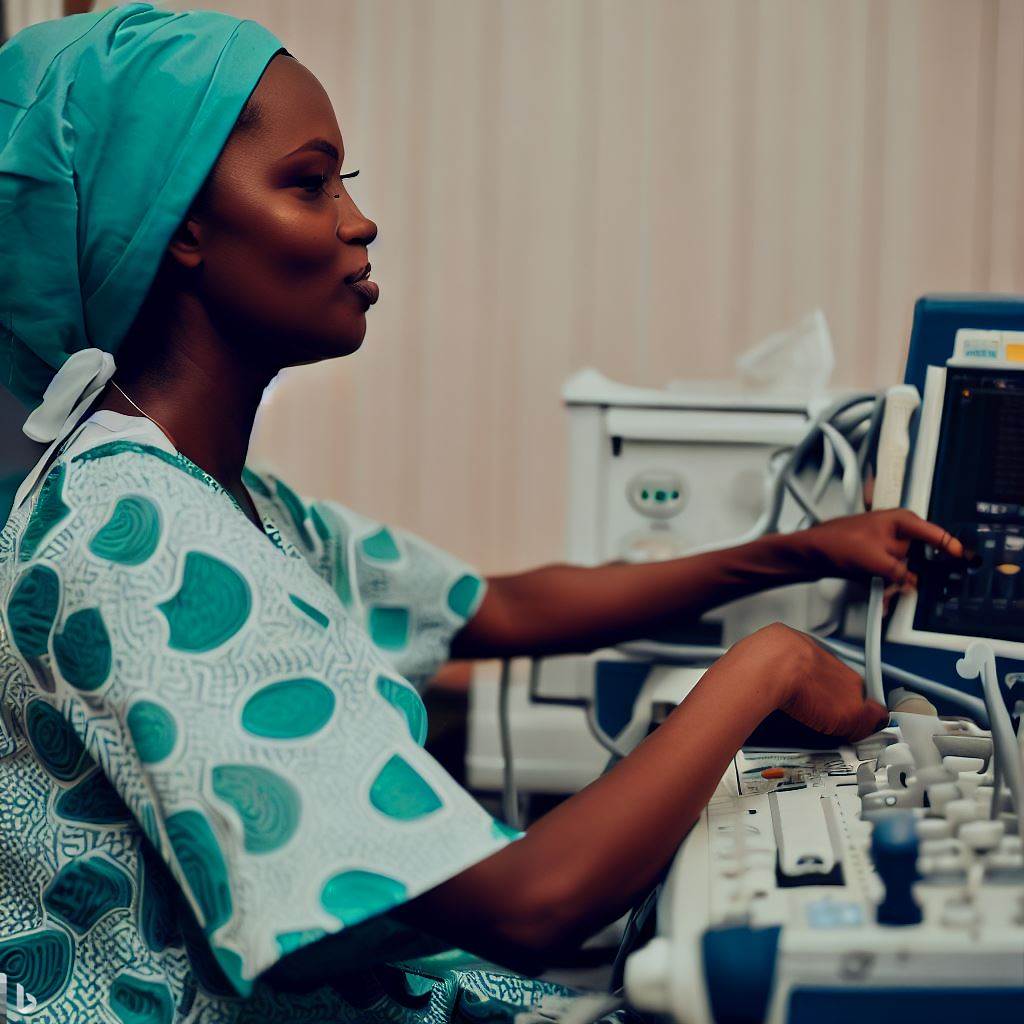Introduction
Let’s delve deeper into gender and the sonography profession in Nigeria
Brief Explanation of Sonography Profession in Nigeria
Sonography is a medical profession that uses ultrasound technology for diagnoses in Nigeria. It plays a crucial role in healthcare.
Sonography profession in Nigeria is a vital medical imaging discipline capturing internal body images.
Addressing gender dynamics is essential to ensure equal opportunities and a diverse workforce in this field.
Gender dynamics, crucial to explore impact on workforce and patient care.
- Sonography in Nigeria is a crucial medical imaging field capturing internal body images for diagnosis.
- Gender dynamics interplay between male and female professionals, shaping the workforce’s composition.
- Importance of addressing gender dynamics – promoting diversity, equality, and inclusivity in the sonography profession.
- Gender representation affects patient comfort, encouraging diversity helps cater to varied preferences.
- Balanced gender workforce fosters innovation, diverse perspectives lead to better problem-solving and advancements.
- Tackling gender disparities ensures equal opportunities for career growth and leadership positions.
- By understanding gender dynamics, we create a supportive environment for all professionals in sonography.
- This chapter explores the nuances of gender within Nigeria’s sonography profession, unraveling its significance.
Gender disparities in the sonography profession
Lack of female representation
- Statistics on the low number of female sonographers in Nigeria: According to recent data, only 15% of sonographers in Nigeria are female, indicating a significant gender gap in the profession.
- Possible reasons for the gender gap
Societal expectations and stereotypes
Societal norms often dictate that certain professions, including sonography, are more suitable for men, creating limited opportunities for women.
Cultural barriers and traditional gender roles
Gender disparities in the Nigerian sonography profession stem from societal expectations and stereotypes, which discourage women from pursuing careers in this field.
- Challenge and transform gender norms, promoting inclusivity and diversity in education and healthcare settings.
- Encourage young girls to excel in STEM, including sonography, to break down gender barriers.
- Provide equal opportunities, support, and mentoring for women in sonography.
- Create an inclusive and supportive environment to attract and retain female sonographers.
- Engage with community leaders to change perceptions of gender roles through educational campaigns.
- Address cultural barriers and traditional gender roles to promote gender equality in sonography.
- Work towards achieving gender balance and inclusivity in the Nigerian sonography profession.
Read: The Future of Diagnostic Medical Sonography in Nigeria
Challenges faced by female sonographers in Nigeria
Cultural biases and discrimination
- Female sonographers in Nigeria have limited access to training and educational opportunities.
- The workplace often exhibits a prevalence of gender-based discrimination, making it challenging for female sonographers.
Balancing work-life responsibilities
- Societal expectations heavily influence women’s career choices, affecting female sonographers.
- Female sonographers face struggles in managing work and family commitments due to cultural norms.
Read: The Role of Lab Technicians in Nigeria’s Healthcare

Strategies for promoting gender equality in the sonography profession
Encouraging girls’ interest in STEM fields
- Early exposure to science and technology is crucial in fostering girls’ interest in sonography.
- Implementation of programs that offer support and mentorship to young girls interested in pursuing a career in sonography.
Addressing cultural barriers
- Advocacy for gender equality in education and career opportunities to break down cultural barriers.
- Promotion of diversity and inclusion in the workplace through policy changes and awareness campaigns.
Promoting gender equality in sonography:
- Encourage girls’ interest in STEM fields, fostering curiosity about sonography from a young age.
- Create interactive workshops, science fairs, and shadowing opportunities to expose girls to sonography intricacies.
- Implement mentorship programs guiding girls through educational and career paths in sonography.
- Connect aspiring female sonographers with successful women in the field to inspire and empower.
- Address cultural barriers by advocating gender equality in education and career opportunities.
- Raise awareness about the importance of gender equality in healthcare, challenging traditional gender roles.
- Promote diversity and inclusion in the workplace through policy changes and awareness campaigns.
- Implement fair recruitment practices and pay equity to ensure equal opportunities for everyone.
- Educate both genders on the benefits of gender equality in sonography, encouraging active participation for change.
- With these strategies, create an environment where men and women thrive equally in the sonography profession.
Read: Professional Associations for Lab Techs in Nigeria
Success stories of female sonographers in Nigeria
Profiles of successful female sonographers
- Dr. Adaobi Nwosu: Pioneering female sonographer who opened her own successful diagnostic center.
- Mrs. Amina Ibrahim: Overcame societal hurdles to become a respected and sought-after sonographer.
- Dr. Zainab Mohammed: Leading expert in fetal ultrasound with numerous research publications.
Overcoming gender obstacles to achieve professional success
Female sonographers in Nigeria face several challenges due to gender biases and cultural norms. However, despite these obstacles, many women have managed to find success in the profession.
Some of the common challenges include societal expectations that women should prioritize family over their careers, limited access to training opportunities, and unconscious bias from patients and colleagues.
However, these successful female sonographers have defied societal expectations and achieved professional success through their determination, skills, and dedication to their work.
They serve as beacons of inspiration for aspiring sonographers.
Inspirational stories of women making a difference in the field
Dr. Adaobi Nwosu, the first profiled successful female sonographer, faced considerable opposition when she decided to open her own diagnostic center.
Many doubted her abilities and questioned her decision to venture into such a male-dominated field.
However, Dr. Nwosu persevered and proved her doubters wrong by providing high-quality diagnostic services. Her center quickly gained recognition and became a trusted institution for accurate scan results.
Mrs. Amina Ibrahim, another remarkable female sonographer, overcame societal hurdles by constantly upgrading her skills and knowledge. She attended international conferences and pursued advanced certifications in obstetric and gynecological sonography.
Her expertise and passion for her work have made her a sought-after sonographer in Nigeria.
Mrs. Ibrahim’s dedication to providing accurate diagnoses and empathetic patient care has earned her a stellar reputation in the medical community.
Dr. Zainab Mohammed is a leading expert in fetal ultrasound who has made significant contributions to the field through her research.
Despite facing initial skepticism, she persevered and published numerous research papers that have helped advance the understanding of fetal sonography in Nigeria.
Her work has not only enhanced the quality of sonographic services but also improved prenatal care for expecting mothers across the country.
Essentially, the success stories of these female sonographers in Nigeria demonstrate their exceptional skills, determination, and resilience in overcoming gender obstacles.
They have not only achieved professional success but also made significant contributions to the field of sonography.
By sharing their stories, we hope to inspire and empower more women to pursue careers in sonography and break down barriers that limit their professional growth.
Read: Challenges Faced by Clinical Lab Technicians in Nigeria
Conclusion
All in all, it is evident that there are significant gender disparities in the sonography profession in Nigeria.
Women are largely underrepresented in this field, with limited access to training and advancement opportunities. This has resulted in a lack of diversity and inclusivity within the profession.
It is crucial to promote gender equality in the sonography profession to create a more inclusive and progressive environment.
This can be achieved by implementing policies that ensure equal opportunities for both men and women, providing mentorship programs for aspiring female sonographers, and offering scholarships and training programs to bridge the gender gap.
By promoting gender equality, the sonography profession in Nigeria will benefit from diverse perspectives and experiences, leading to improved patient care and better healthcare outcomes.
Additionally, it will empower women to pursue their passion for sonography and contribute to the development of the profession.
It is essential for stakeholders, including government bodies, educational institutions, and professional organizations, to collaborate and take proactive measures to address gender disparities in the sonography profession.
This will not only create a more equitable workplace but also inspire future generations of female sonographers.
In summary, achieving gender equality in the sonography profession is not only a matter of fairness but also a strategic imperative for Nigeria’s healthcare system.
By working towards a more inclusive profession, we can ensure that the benefits of sonography are accessible to all, regardless of gender.




